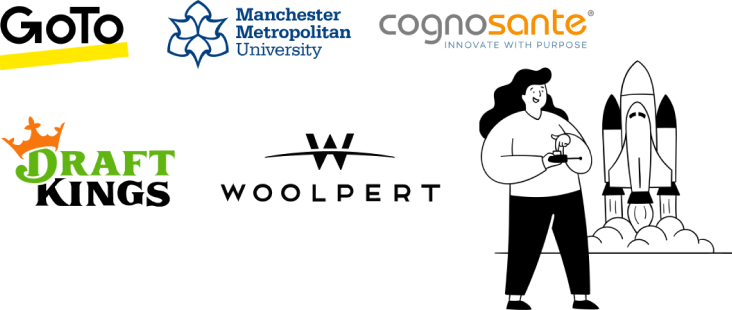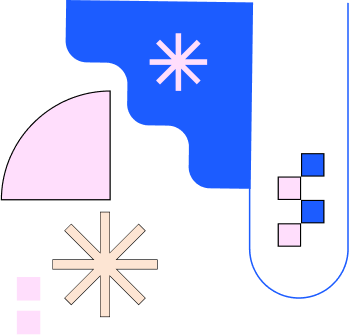
Modern enterprise employee support needs three key capabilities: 24/7 availability, consistent service quality, and scalable operations— areas where traditional helpdesks fall short.
AI agent platforms have emerged as the definitive solution, succeeding where earlier automation efforts fell short. These platforms allow enterprises to build AI agents that understand context, manage complex workflows autonomously, and continuously learn from each interaction.
With the progress in artificial intelligence, the market for these platforms has matured greatly. Each platform brings unique strengths to address specific enterprise needs, including IT service management, HR support, and more.
This guide provides a detailed comparison of the top 8 AI agent platforms, focusing on their key capabilities and pros and cons to help you evaluate them more effectively.
What are AI agent platforms?
An AI agent platform offers an intuitive, low-code/no-code interface for creating, deploying, and managing autonomous agents to help leverage the advanced AI capabilities that of human agency.
These platforms combine advanced large language models for understanding natural employee queries, workflow automation engines that can execute complex multi-step processes, and enterprise integration capabilities that allow AI agents to work seamlessly with existing tools and third-party tools.
This technological foundation enables AI agents to handle everything from simple password resets to complex tasks like employee onboarding, account unlocking, system provisioning, and benefits enrollment.
Why are AI agent platforms important?
AI agent platforms democratize access to advanced AI capabilities like Agentic AI. They're creating new possibilities for using artificial intelligence to solve problems and create value.
AI agent platforms have made automation much more flexible and intelligent. Instead of just handling simple tasks, these platforms can tackle complex problems that require judgment and adaptation. For example, in customer service, AI agents can now understand customer problems, find the right solutions, and even predict issues before they happen.
These platforms have also dramatically reduced the time and effort needed to deploy AI solutions. Instead of spending months building custom integrations, organizations can now use pre-built workflows and connectors.
Another significant benefit is that AI agents enhance human capabilities. They can handle routine tasks, gather and analyze information, and suggest solutions, letting your employees focus on more creative and strategic work.
8 best AI agent platforms to build your own agents for employee support in 2025
With the boom in AI agents, so many platforms are available today. If you are looking for such tools, we’ve picked the eight best ones for you to choose from :
AI agent platforms | Features |
Workativ | Agent studio, AI app workflows, analytics and insights, and Knowledge AI GPT. |
Moveworks | Manifest generator, action orchestrator, slot resolvers, and pre-built connectors. |
Rezolve.ai | Smart agentic AI bot, AI creator studio, AI explainability, and AI analytics. |
Kore.ai | Custom connectors, pre-built AI agents, and multi-agent instructions. |
Microsoft Copilot Studio | Graphical interface, pre-built connectors, pre-built agents. |
Aisera | AI agent orchestration, AI workflow builder, workflow analytics, |
CrewAI | Advanced language model integration, knowledge base, and context management, multi-channel deployment, and analytics dashboard. |
BotPress | Bring your own LLM, custom model strategies, and enterprise security. |
Workativ

Workativ is a platform that offers enterprises the tools to build AI agents and AI workflows to streamline internal support processes, particularly in IT, HR, and employee services. By combining AI agents with no-code automation, Workativ allows companies to reduce manual workloads, speed up ticket resolutions, and enhance the overall employee experience.
Why should you consider Workativ?
Pros:
Cons:
Moveworks

Moveworks is a company that specializes in automating workplace support tasks through artificial intelligence. Its platform focuses on helping employees resolve common issues without waiting for a helpdesk specialist. The system is designed to integrate with existing business applications and interact with employees' existing tools.
What can Moveworks do?
Pros
Cons
Rezolve.ai

Rezolve.ai is software that aims to enhance employee and customer experience by utilizing advanced AI capabilities, ML, and automation. This platform allows you to build autonomous agents by leveraging features like a smart agentic AI bot, AI explainability, an AI creator studio, and more.
What does Rezolve.ai offer?
Pros
Cons
Kore.ai

Kore.ai is an AI agent platform that businesses use to build and deploy virtual agents. You can use this platform to build AI agents that automate workflows, handle repetitive tasks, and manage complex tasks like IT ticket creation, onboarding, user provisioning, and more.
What can Kore.ai do?
Pros
Cons
Microsoft Copilot Studio

Microsoft Copilot Studio is a popular AI agent builder known for its deep integrations with Microsoft’s products suite. By combining AI capabilities with enterprise applications, it helps businesses deploy intelligent, scalable, and secure AI agents without extensive development efforts.
Why consider Microsoft Copilot Studio?
Pros
Cons
Aisera

Aisera is an AI-driven service experience platform that helps enterprises automate and streamline customer service, IT service management, and enterprise support. Leveraging Generative AI, Natural Language Understanding (NLU), and Conversational AI, Aisera enables organizations to deliver fast, accurate, and personalized self-service resolutions.
Why choose Aisera?
Pros
Cons
CrewAI

Crew AI is a platform designed to help businesses and teams create, deploy, and manage AI-powered conversational agents. It enables users to automate support, sales, and operational workflows. Crew AI's flexible architecture supports multi-channel engagement, meaning AI agents can be deployed on websites, messaging apps, or internal business platforms, offering seamless, always-on assistance to end users.
Why choose Crew AI?
Pros
Cons
BotPress

Botpress is a comprehensive AI platform designed to simplify and accelerate the creation of intelligent agents. Initially recognized for its open-source roots, Botpress has evolved into an enterprise-grade solution that combines low-code tools with powerful AI capabilities. It enables developers and non-technical teams to build, deploy, and manage sophisticated agents with great autonomy.
Why consider BotPress?
Pros
Cons
What features should you look for in an AI agent platform?
When evaluating AI agent platforms, you must consider key features like integration, reasoning capabilities, agent customization options, omnichannel support, and user interface. Let’s discuss them in detail:
Integration existing tools
The AI agent platform must connect seamlessly with your current technology stack. This means native integrations with standard enterprise systems like Salesforce, SAP, and Microsoft 365 and the ability to interact with custom APIs and databases.
Advanced reasoning
The platform's reasoning capabilities should enable AI agents to handle complex, multi-step tasks. This includes using reasoning frameworks like ReAct, where agents break down complex problems into sub-tasks, and causal reasoning to understand relationships between events and actions.
Customization and flexibility
Your AI agent platform must allow you to customize AI agents specific to your business needs while maintaining operational stability. This includes defining custom workflows, business rules, and decision-making parameters.
The platform should provide tools for training agents on company-specific knowledge and procedures and allow for the creation of specialized agents for different departments or functions.
Omnichannel deployment
Modern AI agent platforms need to operate seamlessly across multiple channels and interfaces. This means maintaining consistent performance, whether interacting through web interfaces, mobile apps, API calls, or messaging platforms. The platform should handle context switching between channels while maintaining conversation history and task state.
For example, a customer should be able to start an interaction on a website chat, continue through email, and complete it via mobile app, with the agent maintaining full context throughout.
User-friendly interface
A platform with no code and an intuitive user interface helps reduce the learning curve and promote adoption.
Look for a platform that offers a drag-and-drop workflow builder, pre-built templates, and other intuitive tools to build AI agents. This accessibility shortens deployment time, reduces costs, and improves user experience.
Future trends in AI agent platforms
AI agent platforms are moving beyond simple chatbots toward sophisticated autonomous systems that can handle complex tasks, adapt in real-time, and interact seamlessly with enterprise ecosystems. Below is an in-depth look at how these platforms are poised to evolve:
Multimodal intelligence
AI agents are evolving beyond text to understand and work with different types of information simultaneously. They're becoming capable of processing images, voice, text, and data all at once, much like how humans naturally combine different senses to understand the world. For example, future agents will be able to look at a product photo, read customer reviews, analyze sales data, and create comprehensive reports that draw insights from all these sources.
Collaborative intelligence networks
We're moving towards systems where multiple AI agents work together like a well-coordinated team. Each agent specializes in specific tasks but can collaborate with others to solve complex problems. Think of it as a group of experts in different fields working together on a project. One agent might excel at data analysis, another at writing, and a third at visual design. Together, they can create complete solutions that none could achieve alone.
Advanced memory and context understanding
Future platforms are developing more sophisticated ways to remember and understand context over long periods. Agents will maintain a detailed understanding of past interactions, project histories, and organizational knowledge, using this context to make better decisions and provide more personalized responses.
Looking ahead, the focus is on making AI agents better partners for humans rather than replacements. This means creating interfaces that allow people to guide and correct AI agents, share knowledge with them, and understand why they make certain decisions. The goal is to combine human judgment with AI capabilities to solve problems neither could handle alone.
Elevate your employee support with Workativ
Workativ is an AI agent platform that helps enterprises create deeply integrated, context-savvy assistants. These assistants can answer repetitive queries, carry out entire workflows, and collaborate with other agents and human teams to provide exceptional employee support.
Want to see how Workativ helps you effortlessly create, deploy, and manage autonomous AI agents? Book a demo now.
FAQs
What is the difference between AI agents and chatbots?
AI agents proactively handle multi-step tasks and integrate deeply with systems, executing workflows and taking independent actions. Chatbots primarily engage in text-based interactions, often limited to simple Q&A or scripted scenarios. AI agents typically exhibit greater autonomy and problem-solving capabilities.
What are the key features of top AI agent platforms?
Leading AI agent platforms include no-code interface, natural language understanding, workflow orchestration, advanced reasoning, and enterprise integrations. They provide analytics for continuous improvement, maintain security standards, and incorporate error handling to ensure reliable operations.
Is ChatGPT an AI agent?
No, ChatGPT is a language model designed for conversational interactions and content generation, not a full-fledged AI agent orchestrating complex workflows or autonomous actions. It provides responses based on text prompts but lacks built-in system integrations and automation capabilities.
What are the benefits of implementing AI agents?
AI agents streamline repetitive tasks, speed up resolution times, reduce human workload, and enhance service quality. This lowers costs, boosts efficiency, and increases user satisfaction across various business functions.
Plus, AI agents offer data-driven insights and actionable analytics for better decision-making.
What are the examples of AI agent platforms?
Leading AI agent platforms include Workativ, Crew AI, Moveworks, and Kore.ai. They offer features like advanced LLMs, workflow automation, pre-built agents, and enterprise integrations, enabling you to automate tasks and deliver consistent employee support at scale.
In this Blog


About the Author

Narayani Iyear
Narayani is a content marketer with a knack for storytelling and a passion for nonfiction. With her experience writing for the B2B SaaS space, she now creates content focused on how organizations can provide top-notch employee and customer experiences through digital transformation.
Curious by nature, Narayani believes that learning never stops. When not writing, she can be found reading, crocheting, or volunteering.

